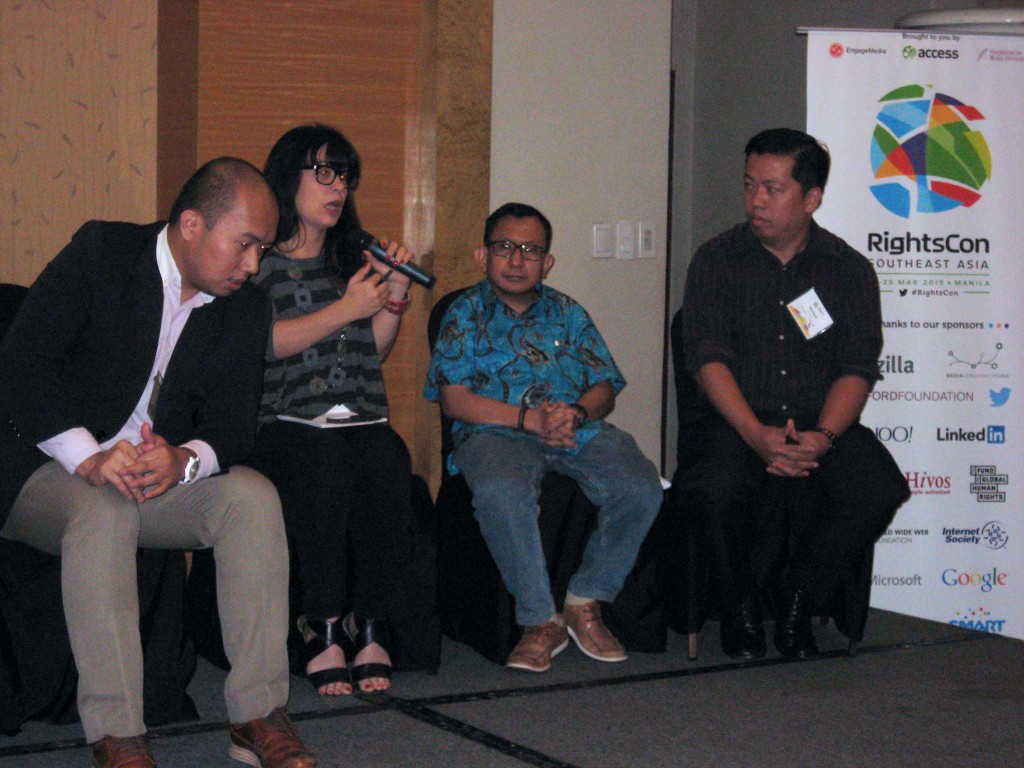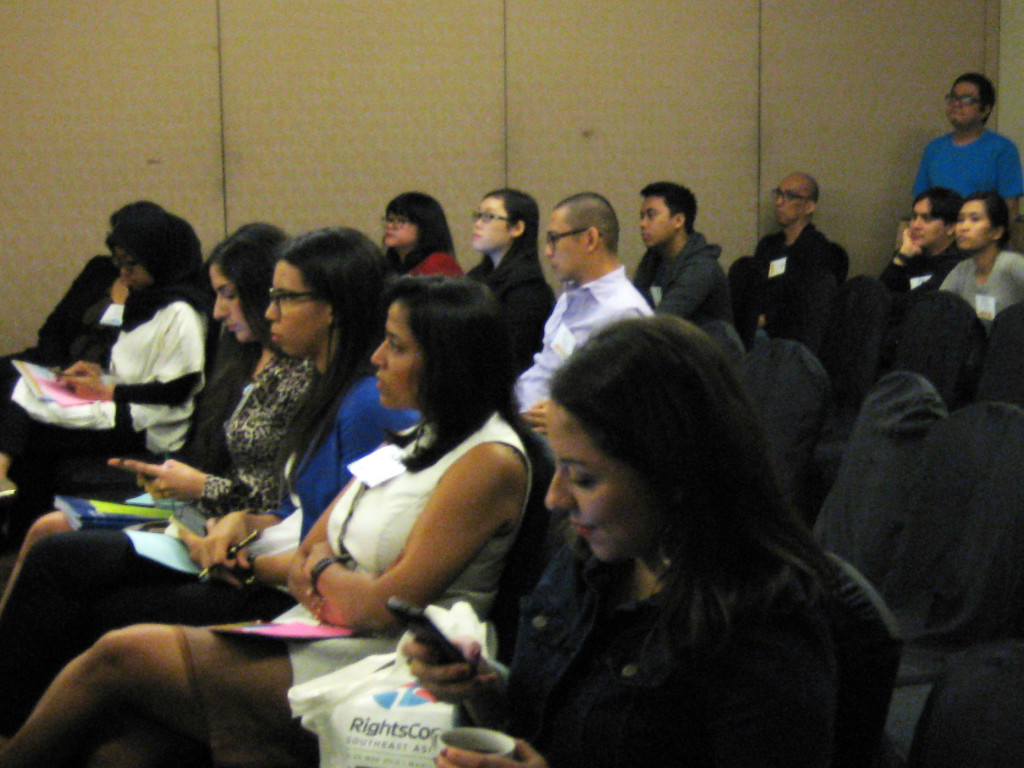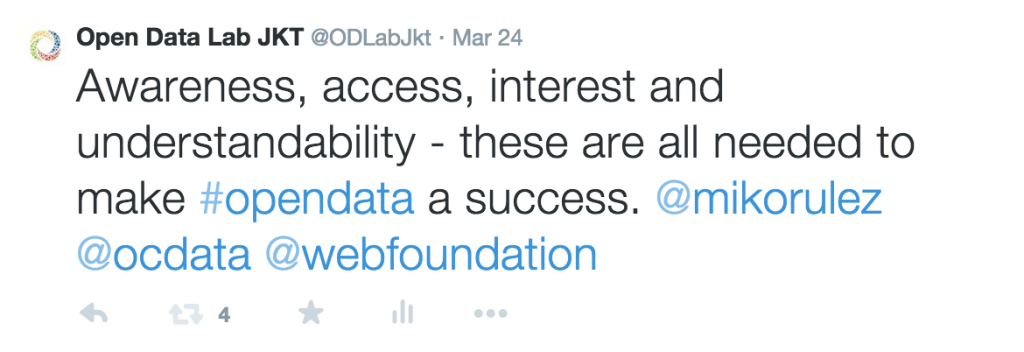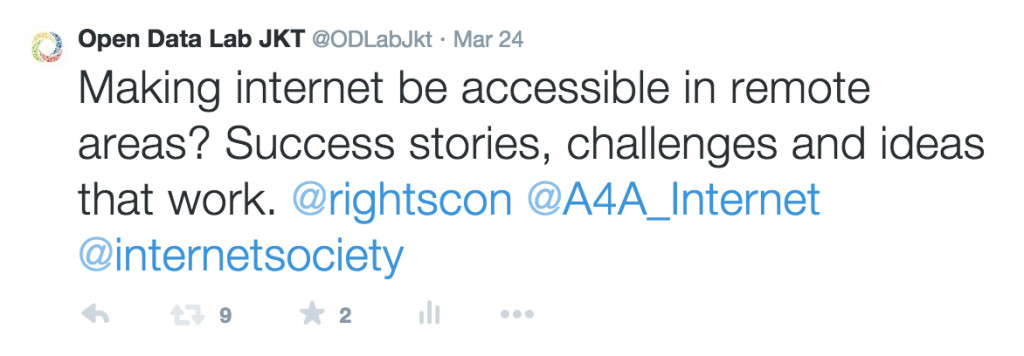The conference area of Crowne Plaza Hotel Manila was buzzing with people attending Rightscon 2015. Representatives across various sectors—from journalists and activists, to major tech players such as Google, Mozilla, Microsoft, and more – were present for the two-day event. The Web Foundation was also present, with members of the Open Data Labs, Web We Want and Alliance for Affordable Internet (A4AI) participating and presenting in sessions that centered on digital rights and opportunities.
The A4AI took part in the opening and participatory session ‘Not Too Inaccessible for Broadband: Connecting Remote Communities with Wireless Spectrum’ organised by the Digital Empowerment Fund. Here, speakers mingled with the partakers in a dialogue on the (in)accessibility and lack of affordable Internet in the region, a topic thoroughly presented in the A4AI Affordability Index. They also tackled challenges, success stories and on-going efforts to provide stable connections to devastated, extremely poor and remote villages in the Philippines, Indonesia, Myanmar and India. Questions on the impact of Internet accessibility were discussed, which led to surface talks on information shared digitally, as well as movements such as Freedom of Information (FoI), Magna Carta for the Web and digital rights. The session concluded with the general agreement that the Internet is a necessary tool for societal growth today, making access to it a human right.
Following this was a session that focused on using the Internet as a platform to campaign for access to open government data and information as a citizen right, entitled ‘A Right to Data? Legal & Practical Challenges at the Intersection of Freedom of Information & Open Data’ led by the Open Data Lab Jakarta. The panel started off with introductions, definitions, and in a participatory ideation with the audience, asking their preliminary ideas on:
- What is the link between FoI and open data?
- What challenges do we foresee in terms of ensuring that FoI and open data will achieve its intended benefits in governance?
- How do we deal with these challenges?
Session participants gave a variety of notable answers. For instance, one was quick to point out how FoI and open data are complementary, in that they both seek forms of transparency. Challenges raised include willingness (from governments to release data), ‘legality’ or regulation of released information, and sustainability; these issues were also brought up in our regional workshop in Jakarta, despite the participants in the two events being completely different. To counter and deal with these hurdles, solutions proposed include creating legal regimes that support FoI and open data, establishing international standards and research tools for measuring open data impacts, such as the Open Data Barometer, and supporting the use of the released data of and by the citizens. This indicated a growing public knowledge and demand for government information, and the need to push for access to it to become a right.


Definitive cases and equations for right to data, open data and the actuality of FoI – comparing it across the region – followed. Case studies from Indonesia and the Philippines were presented by the panelists, wherein open data is used to help improve education, transportation and traffic flow, as well as fiscal transparency. Concrete products, such as data portals and applications, were demonstrated, to show to the audience existing efforts that facilitate the release and use of FoI and open data. Additionally, these projects and outcomes clearly demonstrated the social relevance and potential that FoI, open data and affordable Internet access present, and how they are interlinked.
Wrapping up the first day, two more sessions with participation by the Web Foundation ran parallel. The Jakarta Lab was part of the ‘Open Data and Internet Governance in SEA’ session with Hivos, Change Fusion and the Islamic University of Indonesia. The session centered on FoI laws, promoting transparency and accountability by government offices, and the hurdles these face. Speakers presented multi-stakeholder collaborations that address these issues, and supported civil society and citizen (re)actions that help expose the benefits of open data. Similar to our previous session, the outputs of this discussion were rooted in campaigning for right to data and FoI as a fundamental citizen right.

Simultaneously, the Web We Want team conducted the session ‘Getting It Right from the Start: Internet Startups and Human Rights’. Here, speakers talked about and exchanged with the partakers their experiences on gaining ground in the technology field, as well as the differences and similarities between engaging in private or public sector advocacies. The discussions led to an insightful discourse on security and anonymity in the Internet, as well as agreements on the boundaries of digital rights, including what and how much information should be shared by an individual, a corporation and the government. The importance of connectivity and accessible, stable and affordable Internet were also highlighted—this is, afterall, one of the foundations for an Internet Startup!
The last session, ‘A Magna Carta for the Web: Algorithmic Governance for the Common Good?’, was led by the Web We Want team and held on the afternoon of the second day. A good number of attendees had gathered around to learn about, exchange opinions on, and debate about the concept of the ‘Magna Carta for the Web’, as advocated by Tim Berners-Lee. Ideas of what rights and values should be prevalent on the Web, the concept of a ‘constitution without borders’, crowd-sourcing, and working beyond activism to push for a more self-driven change were some of the points discussed. Issues such as the limits of freedom of speech and FoI were raised by the presenters, as well as the audience and from this, an enthusiastic crowd ideated solutions for a bigger, more inclusive and free Internet.

From pushing for access to the Internet, building Internet startups, to advocating for the recognition of human rights in the digital space, such as right to data, freedom of information and freedom of speech, the Web Foundation covered ground in topics dear to us. Outside of our talks, a great mix of other interesting and highly insightful sessions, panels and presentations were held: from determining human rights in the digital space, pushing for freedom of information, connectivity and the right to be online, the ‘right to be forgotten’ and ‘right to privacy’, to creating effective communications in the digital space, using hashtags and memes for advocacies and more. With the focus of this year’s event in Southeast Asia, there were many lessons and intakes to be gained from experts across various fields, which the Jakarta Lab’s team members took home.
We definitely had a blast at #RightsCon2015 and look forward to the next one! If you missed any of our sessions or couldn’t attend, you cancheck out Rightscon’s live blogging and recorded sessions spaces to get a good recap of what took place.
See you next year!

Leave a Reply